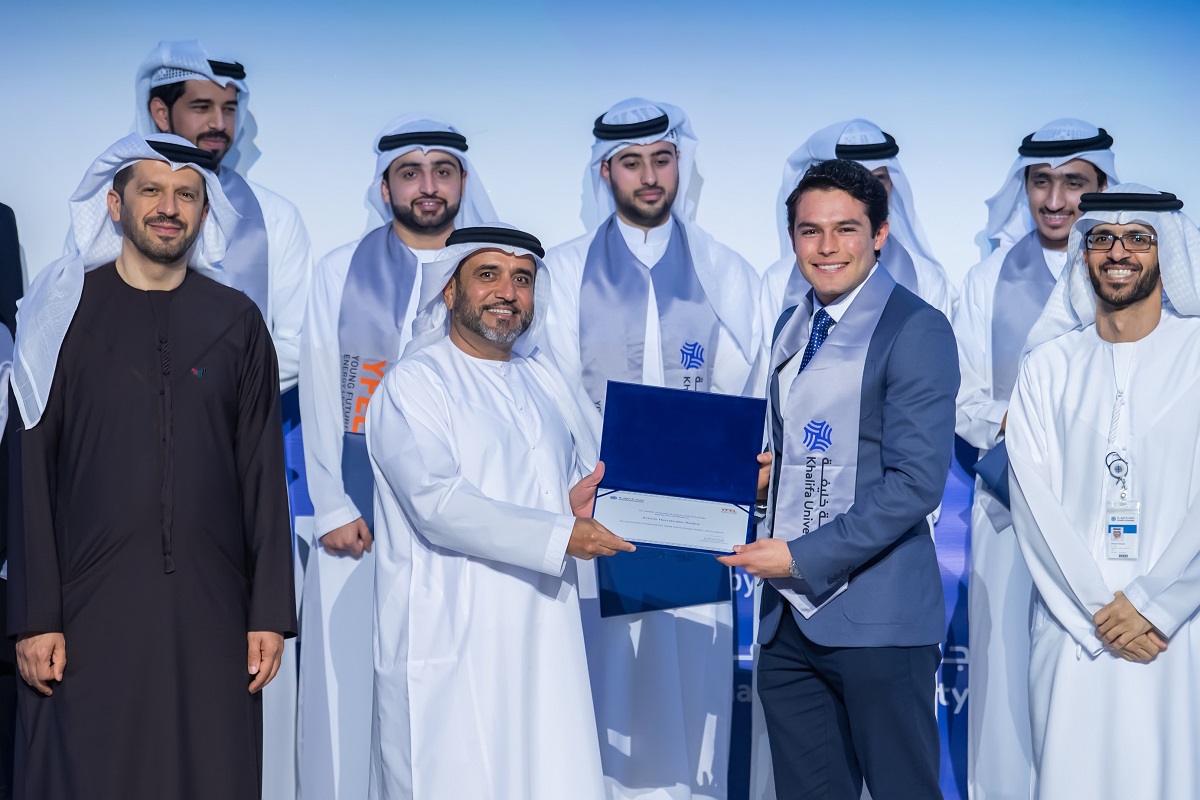
In an uncertain future energy landscape, becoming sustainable requires transformation at every level. It implies not only switching fossil fuels to renewable energy, but also a whole raft of social, political and economic changes on a global scale. Enter the new generation of leaders who will pave the way for this long-term energy transformation.
The Young Future Energy Leaders program is one of the most dynamic platforms in the UAE for fostering tomorrow’s leaders. Aiming to educate, inspire and position students and young professionals to become future leaders capable of solving the world’s most pressing challenges in advanced energy and sustainability, the YFEL program comprises a year-long schedule of courses and overseas visits.
Energy systems are increasingly complex and the UAE’s future scientists, engineers and innovators need the knowledge and technology to build a sustainable energy future. This knowledge includes courses on trends and future energy sustainability as well as technology, policy and leadership. Graduates leave the program with a mix of the education and soft skills needed to lead the world into a more sustainable future.
The YFEL program offers young professionals and students from the UAE and abroad the opportunity to become more engaged in finding solutions to the world’s biggest challenges: achieving energy efficiency and tackling climate change.
Most energy supply and demand outlooks to 2050 suggest that growing global energy demand will continue to be met largely by fossil energy sources, however calls to refrain from further investing in hydrocarbon projects due to environmental concerns are becoming increasingly prevalent. The program’s geographical base in the Middle East is therefore particularly relevant.
The energy sector is under huge pressure from climate change. A challenge for all of humanity, climate change needs to be addressed jointly and calls for changing the energy mix from the traditional hydrocarbons dominating the region towards low-emission sources, such as sun, hydroelectricity, and nuclear power. The United Arab Emirates is investing heavily in all alternative forms of energy – it has set an ambitious target to generate 50 percent of its energy from clean and renewable sources by 2050 – with this research highlighted in the YFEL courses.
Future energy leaders need to balance the de-carbonization of our energy supply with the need to provide the world with affordable, reliable and modern energy, as per the United Nation’s Sustainable Development Goals.
Humanity needs to work together and enhance international cooperation. The YFEL program facilitates access to clean energy research and technology, including renewable energy, energy efficiency and advanced and cleaner fossil-fuel technology, with graduates promoting investment in energy infrastructure and clean energy technology.
Reaching a sustainable future requires thinking of the short-term as well as the long-term. The Middle East’s significant natural resource supplies need to be carefully considered to be best utilized in the evolving energy landscape—for example, using hydrocarbon energy to fill the gaps in renewable supply or prioritizing their availability for export and national industry. Fossil fuels will remain part of the future energy mix but their share in the future landscape must be reduced considerably to achieve sustainability goals.
Technology to generate clean energy from hydrocarbon fuels without harmful emissions, such as the Allam Cycle, need to be prioritized as the world is led into the future.
In the long-term, leadership and vision are in high demand. The inertia of government, the long operating life of investments in the energy sector and energy security issues are commonly considered the main obstacles preventing the transition needed in this area. The world needs leaders to drive the substantial change in attitude and behavior required to achieving global sustainability. To that end, the leadership, policy and business acumen imparted to the YFEL graduates will see them drive the commitments from state and non-state actors alike.
This is a challenging prospect, one for which these future leaders are extensively prepared. Long-term energy transformation needs more than the technologies already in use or in development—the plans laid today need to consider even more innovative and visionary technologies that don’t exist yet. The so-called sustainable development trilemma looms: currently, providing energy security, energy equity and environmental sustainability simultaneously simply isn’t possible. A highly secure and environmentally-friendly energy supply would mean prohibitively high costs preventing equal access. But an accessible and secure energy supply for everyone the world over cannot be achieved without using fossil fuels, contributing to the environmental damage that has led us to climate change.
New technologies may make this possible but it takes visionaries to plan for these.
With the stage set from their successful completion of the YFEL program, the energy leaders of tomorrow are ready to change the world.
Jade Sterling
News and Features Writer
15 January 2020